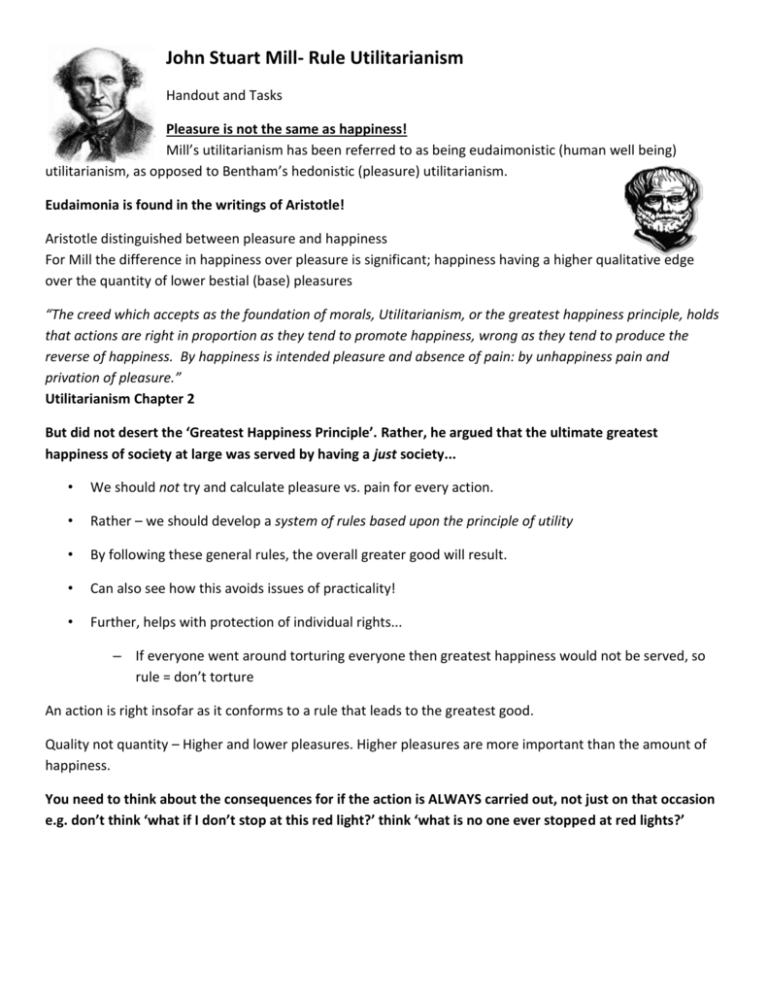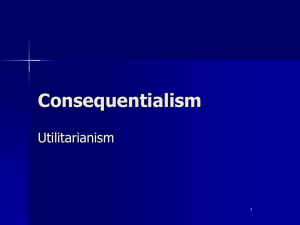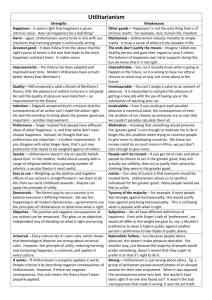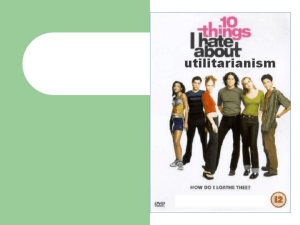File - Philosophy For Life
advertisement

John Stuart Mill- Rule Utilitarianism Handout and Tasks Pleasure is not the same as happiness! Mill’s utilitarianism has been referred to as being eudaimonistic (human well being) utilitarianism, as opposed to Bentham’s hedonistic (pleasure) utilitarianism. Eudaimonia is found in the writings of Aristotle! Aristotle distinguished between pleasure and happiness For Mill the difference in happiness over pleasure is significant; happiness having a higher qualitative edge over the quantity of lower bestial (base) pleasures “The creed which accepts as the foundation of morals, Utilitarianism, or the greatest happiness principle, holds that actions are right in proportion as they tend to promote happiness, wrong as they tend to produce the reverse of happiness. By happiness is intended pleasure and absence of pain: by unhappiness pain and privation of pleasure.” Utilitarianism Chapter 2 But did not desert the ‘Greatest Happiness Principle’. Rather, he argued that the ultimate greatest happiness of society at large was served by having a just society... • We should not try and calculate pleasure vs. pain for every action. • Rather – we should develop a system of rules based upon the principle of utility • By following these general rules, the overall greater good will result. • Can also see how this avoids issues of practicality! • Further, helps with protection of individual rights... – If everyone went around torturing everyone then greatest happiness would not be served, so rule = don’t torture An action is right insofar as it conforms to a rule that leads to the greatest good. Quality not quantity – Higher and lower pleasures. Higher pleasures are more important than the amount of happiness. You need to think about the consequences for if the action is ALWAYS carried out, not just on that occasion e.g. don’t think ‘what if I don’t stop at this red light?’ think ‘what is no one ever stopped at red lights?’ Tasks: 1. Arrange the following pleasures from higher to lower quality: eating, listening to music, making music, drinking alcohol, watching a good movie, viewing beautiful artwork, spending time with your partner, spending time with your friends, attending family gatherings, eating chocolate, reading or hearing poetry, playing sport, achieving fame 2. How do we distinguish between two higher pleasures? How could the pleasures to be gained from playing Bach be measured against the pleasures to be gained from seeing a Shakespearian play? Give examples 3. Is it better to be intellectually aware of the world’s imperfections and the sufferings of people and, hence, be unhappy or dissatisfied, or is it better to be blissfully ignorant of the world’s troubles and, hence, be happy and content with life? 4. Complete the other worksheet in pairs on how Rule Utilitarianism improved on the weaknesses of Act Utilitarianism. Add four weaknesses of Rule Utilitarianism at the bottom of the sheet. EXTENSION: Can you think of how you could resolve any of the problems of Rule Utilitarianism? Could these weaknesses be turned into strengths if you were to make your own type of utilitarianism? 5. In small groups (3 or 4), you are now the government,. Basing laws on utilitarianism, which laws would you choose? I want you to produce your ‘Top 10’ rules for the country. You need to discuss these and agree on them. You need to be able to explain why you have chosen these to the rest of the class. EXTENSION: Can you envisage any conflicts with your laws? How do you think the general public would respond to your laws? 6. issue with Rule Utilitarianism is that sometimes there may be times where following the general rule will not bring about the greatest happiness. My usual example: General Rule – Save someone who is drowning. Problem – Saving Hitler would not bring the greatest happiness for the greatest number. 7. Complete a revision poster on Mill Extension- Make own for Bentham on the computers



